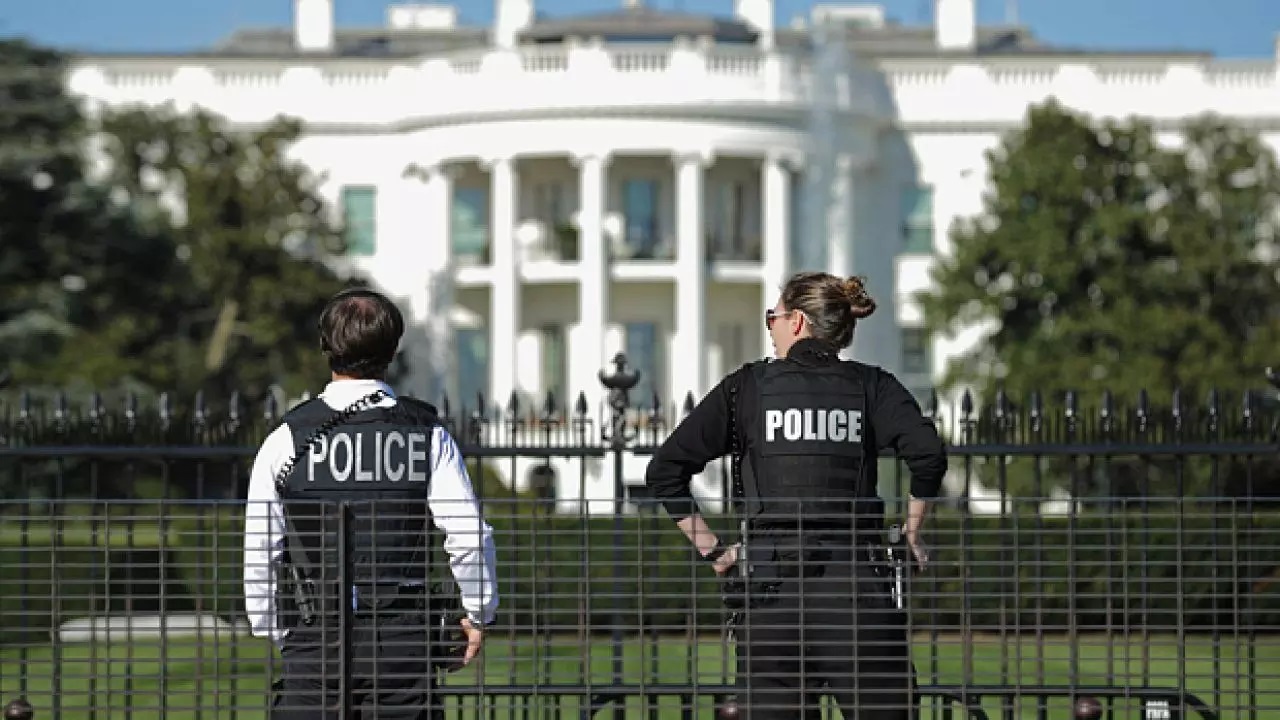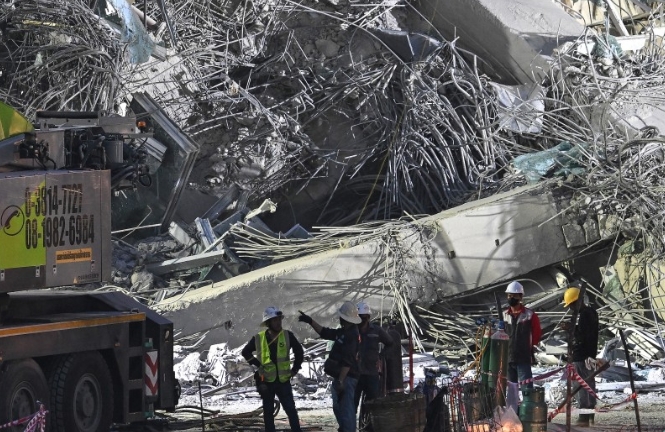Foreign
Massive loss for Biden’s administration as U.S Supreme Court allows Texas to enforce immigration laws

The Supreme Court on Tuesday allowed Texas to enforce for now a contentious new law that gives local police the power to arrest migrants.
The conservative-majority court, with three liberal justices dissenting, rejected an emergency request by the Biden administration, which said states have no authority to legislate on immigration, an issue the federal government has sole authority over.
That means the law can go into effect while litigation continues in lower courts. It could be blocked at a later date. Texas Gov. Greg Abbott, a Republican, hailed the court order, calling it “clearly a positive development,” though he acknowledged that the legal battle is not over. Joe Biden becomes first incumbent president to lose Democrat primary election in Samoa
White House press secretary Karine Jean-Pierre said in a statement that the law “will not only make communities in Texas less safe, it will also burden law enforcement and sow chaos and confusion at our southern border.”
“The court gives a green light to a law that will upend the longstanding federal-state balance of power and sow chaos,” liberal Justice Sonia Sotomayor wrote in a dissenting opinion. Justices Elena Kagan and Ketanji Brown Jackson also objected to the decision.
The majority did not explain its reasoning, but one of the conservative justices, Amy Coney Barrett, wrote separately to note that an appeals court has yet to weigh in on the issue. Advertisements “If a decision does not issue soon, the applicants may return to this court,” she wrote. Her opinion was joined by fellow conservative Justice Brett Kavanaugh.
The court has a 6-3 conservative majority. In response to the Supreme Court order, the New Orleans-based 5th U.S. Circuit Court of Appeals fast-tracked oral arguments on the Biden administration’s effort to block the law. Arguments are set to take place Wednesday morning, meaning a decision could come quickly.
The law in question, known as SB4, allows police to arrest migrants who illegally cross the border from Mexico and imposes criminal penalties. It would also empower state judges to order people to be deported to Mexico.
A top Mexico official said Tuesday in a statement on X that the country will not accept deportations from Texas.
According to a spokesperson for the Texas Department for Public Safety, there is no start date yet for enforcement of the law. Lt. Chris Olivarez said that state officials have been planning for its implementation for months, but they’re still discussing some practical details.
In Val Verde County on the U.S.-Mexico border, Sheriff Joe Frank Martinez said his small force, with three deputies on duty around the clock for a 3,145 square mile county of 47,586 people, will not start arresting migrants until he receives guidance from the state.
“I think that we all are in uncharted waters,” he said Tuesday.
He said not only is he not sure how and when to initiate enforcement of the state law, but that he will likely need more deputies and jail space if tasked with the new enforcement initiative. The county jail has a daily capacity of 94, Martinez said.“Right now we’re not equipped to handle that,” he said.
The dispute is the latest clash between the Biden administration and Texas over immigration enforcement on the U.S.-Mexico border. In a separate opinion, Kagan wrote that the Texas law appears to conflict with federal law, noting that “the subject of immigration generally, and the entry and removal of noncitizens particularly, are matters long thought the special province of the federal government.”
A federal judge blocked the law after the Biden administration sued, but the New Orleans-based 5th U.S. Circuit Court of Appeals said in a brief order that it could go into effect March 10 if the Supreme Court declined to intervene.
The appeals court has not yet decided whether to grant the federal government’s request to block the law. On March 4, Justice Samuel Alito issued a temporary freeze on the law to give the Supreme Court time to consider the federal government’s request. Solicitor General Elizabeth Prelogar said in court papers that the law is “flatly inconsistent” with Supreme Court precedent dating back 100 years.
“Those decisions recognize that the authority to admit and remove noncitizens is a core responsibility of the national government, and that where Congress has enacted a law addressing those issues, state law is preempted,” she wrote.
The appeals court, Prelogar added, did not explain its reasoning for allowing the law to go into effect. She dismissed Texas’ argument that its law can be defended on the basis that the state is effectively battling an invasion at the border under the State War Clause of the Constitution.
The provision says states cannot “engage in war, unless actually invaded” or in imminent danger. “A surge of unauthorized immigration plainly is not an invasion within the meaning of the State War Clause,” Prelogar wrote.
Defending the law, Texas Attorney General Ken Paxton said in court papers that the measure complements federal law and the state should be allowed to enforce it.
The Constitution “recognizes that Texas has the sovereign right to defend itself from violent transnational cartels that flood the state with fentanyl, weapons, and all manner of brutality,” he added.
Texas is “the nation’s first-line defense against transnational violence and has been forced to deal with the deadly consequences of the federal government’s inability or unwillingness to protect the border,” Paxton said.
The city of El Paso and two immigrant rights groups, Las Americas Immigrant Advocacy Center and American Gateways, have also challenged the law and filed their own emergency request at the Supreme Court.
In 2012, the Supreme Court invalidated provisions of a tough immigration law enacted in Arizona. Only two of the justices who were in the majority in that case are still on the court: Chief Justice John Roberts and Sotomayor.
Biden administration outrage over Supreme Court verdict President Biden Outraged over Supreme Court’s Decision Granting Texas Authority to Arrest Undocumented Immigrants Pending Final Ruling, Making Border Crossings a State Crime.
In a statement, the Biden White House writes, “We fundamentally disagree with the Supreme Court’s order allowing Texas’ harmful and unconstitutional law to go into effect. “S.B. 4 will not only make communities in Texas less safe, it will also burden law enforcement, and sow chaos and confusion at our southern border.
“S.B. 4 is just another example of Republican officials politicizing the border while blocking real solutions. “We remained focused on delivering the significant policy changes and resources we need to secure the border – that is why we continue to call on Congressional Republicans to pass the bipartisan border security agreement, the toughest and fairest set of border reforms in decades.”
Foreign
U.S. prohibits personnel in China from romantic, sexual relationships with Chinese citizens

The U.S. government has banned American government personnel in China, as well as family members and contractors with security clearances, from any romantic or sexual relationships with Chinese citizens, The Associated Press has learned.
Four people with direct knowledge of the matter told the AP about the policy, which was put into effect by departing U.S. Ambassador Nicholas Burns in January shortly before he left China. The people would speak only on condition of anonymity to discuss details of a confidential new directive.
Though some U.S. agencies already had strict rules on such relationships, a blanket “non-fraternization” policy, as it is known, has been unheard of publicly since the Cold War. It’s not uncommon for American diplomats in other countries to date locals and even marry them.
A more limited version of the policy was enacted last summer prohibiting U.S. personnel from “romantic and sexual relations” with Chinese citizens working as guards and other support staff at the U.S. Embassy and five consulates in China. But Burns, the departing ambassador, broadened it to a blanket ban on such relations with any Chinese citizen in China in January, days before President Donald Trump took office. The AP was unable to determine exactly how the policy defined the phrase “romantic or sexual relationship.”
Two of the people with knowledge of the ban told the AP the new policy was first discussed last summer after members of Congress contacted Burns to express concern that restrictions on such relationships were not stringent enough. The House Select Committee on the Chinese Communist Party did not respond to a request for comment.
The new policy covers U.S. missions in mainland China, including the embassy in Beijing and consulates in Guangzhou, Shanghai, Shenyang and Wuhan, as well as the American consulate in the semi-autonomous territory of Hong Kong. It does not apply to U.S. personnel stationed outside China.
The only exception to the policy is U.S. personnel with pre-existing relations with Chinese citizens; they can apply for exemptions. If the exemption is denied, they must end the relationship or leave their position, the people said. Anyone who violates the policy will be ordered to leave China immediately.
The policy was communicated verbally and electronically to American personnel in China in January, but has not been publicly announced.
The State Department said it does not comment on internal matters. The National Security Council referred questions to the State Department. Burns, the former ambassador, did not reply to an AP request sent to his email address at The Cohen Group, a consultancy that he rejoined as vice chair in February.
Intelligence services across the world have long used attractive men and women to obtain sensitive information, famously during the Cold War. The State Department and other agencies with offices in China have long had stringent reporting requirements on personal relationships for American personnel stationed there, as well as rivals considered high intelligence threats such as Russia or Cuba.
Declassified State Department documents show that in 1987, the U.S. government barred personnel stationed in the Soviet bloc and China from befriending, dating or having sex with locals after a U.S. Marine in Moscow was seduced by a Soviet spy. Such restrictions were relaxed after the collapse of the Soviet Union in 1991, according to news reports at the time.
In China, a blanket ban on such relations has not been in effect for many years. Until the new ban in January, U.S. personnel in China were required to report any intimate contact with Chinese citizens to their supervisors, but were not explicitly forbidden from sexual or romantic relationships.
U.S. diplomats and intelligence experts say that Beijing continues to aggressively use so-called honeypots to access American secrets. In presentations before being stationed in China, U.S. personnel are briefed on case studies where Chinese intelligence services sent attractive women to seduce American diplomats, and warned that dozens of Chinese state security agents can be assigned to monitor any individual diplomat of interest.
Little is known about the U.S. government’s non-fraternization policies elsewhere, as they are considered classified. It is unknown how restrictive such policies are in other countries.
In recent years, tensions between Washington and Beijing have escalated over trade, technology and geopolitical competition.
Peter Mattis, a former CIA analyst and president of The Jamestown Foundation, a Washington-based think tank, said there were at least two publicized cases in which Chinese agents seduced American diplomats stationed in China, though he hasn’t heard of such a case in recent years.
Mattis added that another issue is that Chinese state security doesn’t gather intelligence just through spies, but also by pressing ordinary Chinese people for information, often through threats or intimidation. That, Mattis said, means any Chinese citizen who dates an American diplomat could be vulnerable to coercion.
“The MSS is willing to leverage any human connection that a target has to collect intelligence,” Mattis said, using an acronym referring to China’s Ministry of State Security. “This rule change suggests the MSS has gotten a lot more aggressive at trying to access the embassy and U.S. government.”
The Chinese foreign ministry did not comment on the ban, saying in a faxed statement that it was “more appropriate to ask the U.S. about this question.”
China also has been tightening already strict controls on its personnel overseas, according to Chinese regulations, news reports and four people familiar with China’s bureaucracy who spoke on condition of anonymity so they could discuss a sensitive topic. In recent years, Beijing began strictly enforcing regulations that bar promotions for Chinese civil servants with spouses who acquired foreign citizenship and restrict diplomats from spending an extended period of time in one country, forcing some to return to China.
China’s foreign ministry and many other government bodies bar their officials and staff from sexual or romantic relations with foreign citizens, while members of the Chinese military or police are generally barred from leaving China altogether without express approval from their supervisors.
Foreign
Suspicious package found near White House day after Trump imposed tariffs

Law enforcement is currently responding to reports of a suspicious package near the White House.
The area has been secured, and specialized units are on-site to assess the situation.
Authorities are urging the public to avoid the vicinity until further notice.
The section between 15th and 17th streets is completely shut down.
The bomb squad is now examining a suspicious package discovered in a dumpster nearby.
The package was found about 500 meters from the White House. President Donald Trump is currently in residence.
This is coming a day after Trump imposed tariffs on several countries, including US allies.
Foreign
Myanmar Quake Victim Rescued After 5 Days

Rescuers on Wednesday pulled a man alive from the rubble five days after Myanmar’s devastating earthquake, as calls grew for the junta to allow more aid in and halt attacks on rebels.
The shallow 7.7-magnitude earthquake on Friday flattened buildings across Myanmar, killing more than 2,700 people and making thousands more homeless.
Several leading armed groups fighting the government have suspended hostilities during the quake recovery, but junta chief Min Aung Hlaing said military operations would continue — despite international criticism of multiple reported air strikes.
UN agencies, rights groups and foreign governments have urged all sides in Myanmar’s civil war to stop fighting and focus on helping those affected by the quake, the biggest to hit the country in decades.
Hopes of finding more survivors are fading, but there was a moment of joy on Wednesday as a man was pulled alive from the ruins of a hotel in the capital Naypyidaw.
The 26-year-old hotel worker was extracted by a joint Myanmar-Turkish team shortly after midnight, the fire service and junta said.
Dazed and dusty but conscious, the man was pulled through a hole in the rubble and put on a stretcher, video posted on Facebook by the Myanmar Fire Services Department showed.
Call for peace
Min Aung Hlaing said Tuesday that the death toll had risen to 2,719, with more than 4,500 injured and 441 still missing.
But with patchy communication and infrastructure delaying efforts to gather information and deliver aid, the full scale of the disaster has yet to become clear, and the toll is likely to rise.
The World Health Organization (WHO) reported severe damage in the city of Sagaing, citing local rescuers saying one in three houses there have collapsed.
Healthcare facilities, damaged by the quake and with limited capacity, are “overwhelmed by a large number of patients”, while supplies of food, water and medicine are running low, WHO said in an update.
Sagaing has seen some of the heaviest fighting in Myanmar’s civil war, and AFP journalists have not been able to reach the area.
Relief groups say the overall quake response has been hindered by continued fighting between the junta and the complex patchwork of armed groups opposed to its rule, which began in a 2021 coup.
Julie Bishop, the UN special envoy on Myanmar, called on all sides to “focus their efforts on the protection of civilians, including aid workers, and the delivery of life-saving assistance”.
Even before Friday’s earthquake, 3.5 million people were displaced by the fighting, many of them at risk of hunger, according to the United Nations.
Late Tuesday, an alliance of three of Myanmar’s most powerful ethnic minority armed groups announced a one-month pause in hostilities to support humanitarian efforts in response to the quake.
The announcement by the Three Brotherhood Alliance followed a separate partial ceasefire called by the People’s Defence Force — civilian groups that took up arms after the coup to fight junta rule.
But there have been multiple reports of junta air strikes against rebel groups since the quake.
“We are aware that some ethnic armed groups are currently not engaged in combat, but are organising and training to carry out attacks,” said Min Aung Hlaing, mentioning sabotage against the electricity supply.
“Since such activities constitute attacks, the Tatmadaw (armed forces) will continue to carry out necessary defensive activities,” he said in a statement late Tuesday.
But the UN special rapporteur on human rights in Myanmar, Tom Andrews, rejected the junta’s characterisation of its operations.
“Senior General Min Aung Hlaing has described ongoing junta attacks in the midst of Myanmar’s suffering as ‘necessary protective measures’,” he wrote on X.
“They are neither necessary nor protective. They are outrageous and should be condemned in the strongest possible terms by world leaders.”
Rescue teams work to save residents trapped under the rubble of the destroyed Sky Villa Condominium development in Mandalay on March 29, 2025, a day after an earthquake struck central Myanmar. More than 90 people could be trapped inside the crushed remains of an apartment block in Mandalay in central Myanmar destroyed by a devastating earthquake, a Red Cross official told AFP on March 29 as rescuers worked to free the victims. (Photo by Sai Aung MAIN / AFP)
Thailand toll rises
Australia’s government decried the reported air strikes saying they “exacerbated the suffering of the people”.
“We condemn these acts and call on the military regime to immediately cease military operations and allow full humanitarian access to affected areas,” Foreign Minister Penny Wong said.
Amnesty International said “inhumane” military attacks were significantly complicating earthquake relief efforts in Myanmar.
“You cannot ask for aid with one hand and bomb with the other,” said the group’s Myanmar researcher Joe Freeman.
Hundreds of kilometres away, in the Thai capital Bangkok, workers continued to scour through the rubble of a collapsed 30-storey skyscraper.
The structure had been under construction when the earthquake hit and its crash buried dozens of builders — few of whom have come out alive.
The death toll at the site has risen to 22, with more than 70 still believed trapped in the rubble.
AFP
-

 News20 hours ago
News20 hours agoNatasha: Kogi PDP hammers Ododo, reiterates unfeigned support for her
-

 Economy19 hours ago
Economy19 hours agoSEE Black Market Dollar To Naira Exchange Rate Today 3rd April 2025
-

 News15 hours ago
News15 hours agoJust in: “Ignore rumour mongers, there was no time I collapsed “-Wike asserts
-

 News15 hours ago
News15 hours agoCJ transfers Natasha’s case to Justice Nyako
-

 News18 hours ago
News18 hours agoJust in: INEC dumps recall petition against Sen Natasha
-

 News23 hours ago
News23 hours agoJust in: Finally, Trump imposes 14% tarriff on Nigeria oil, others
-

 News11 hours ago
News11 hours agoWe’re putting together new 2025 Budget for Rivers-Ibas
-

 News20 hours ago
News20 hours agoUS cancels ex- president ,Nobel Peace Prize winner Oscar Arias visa





